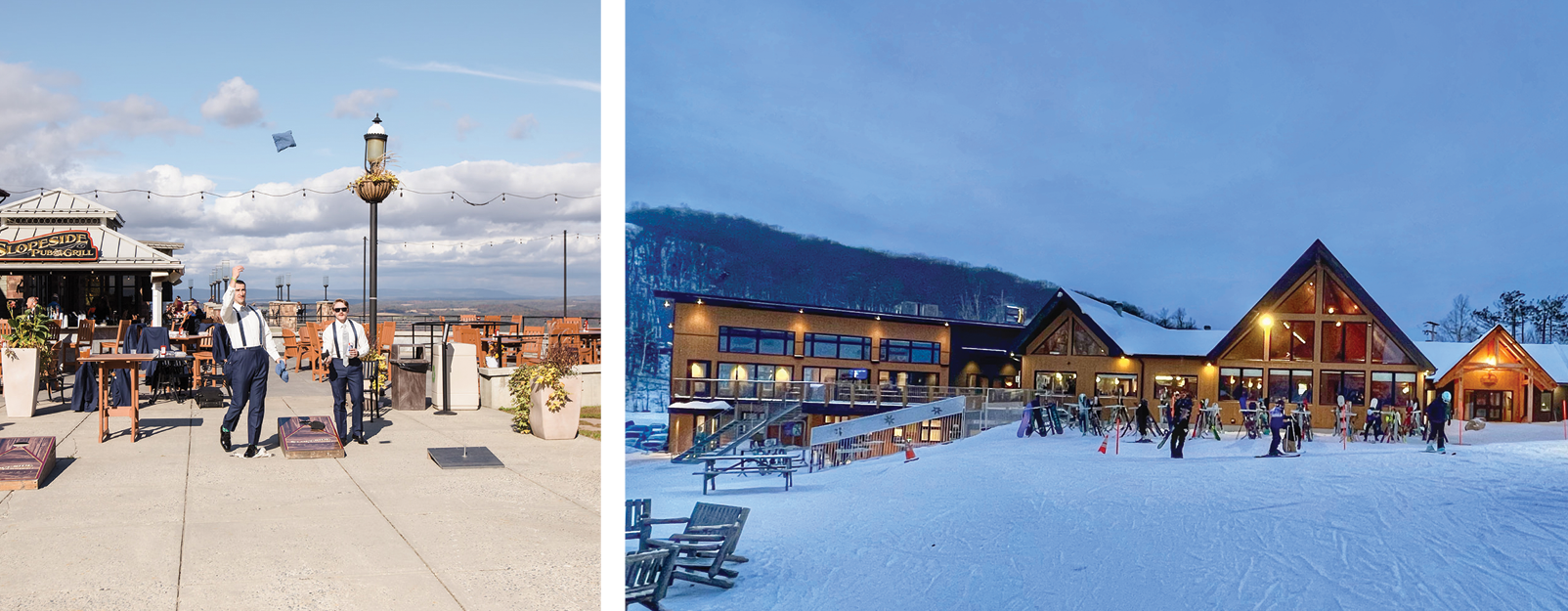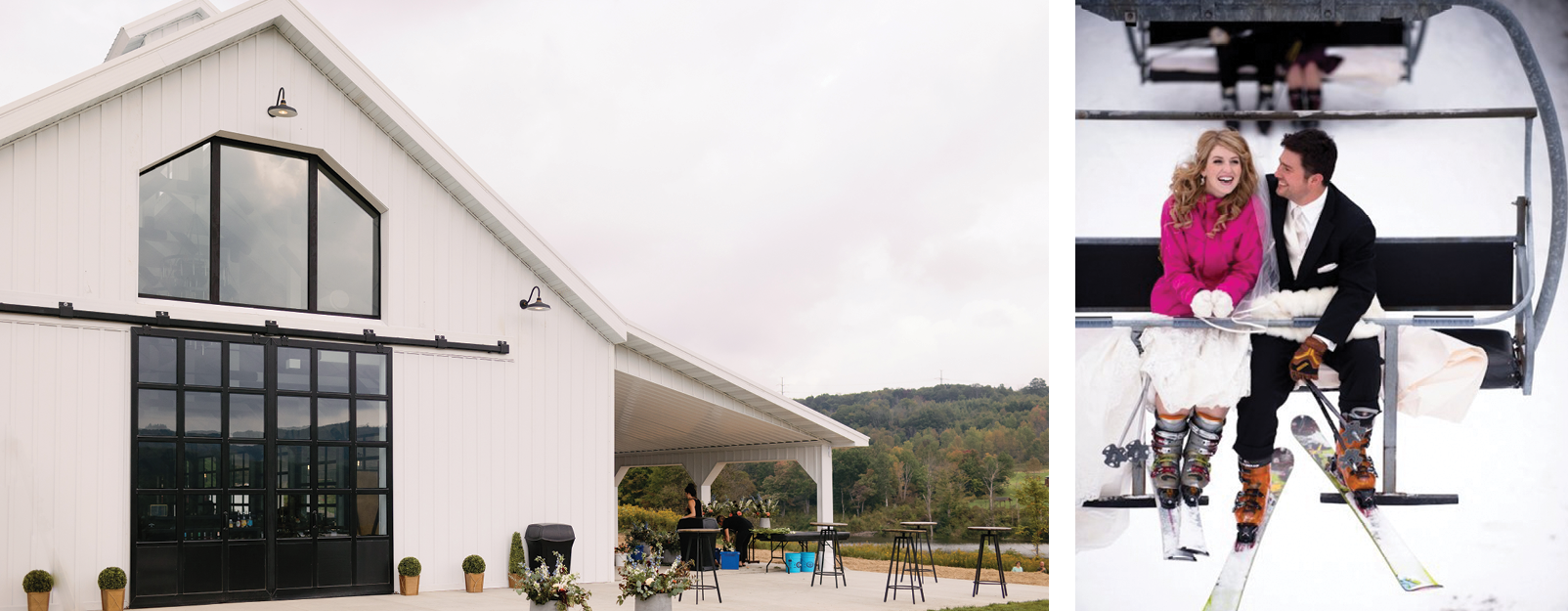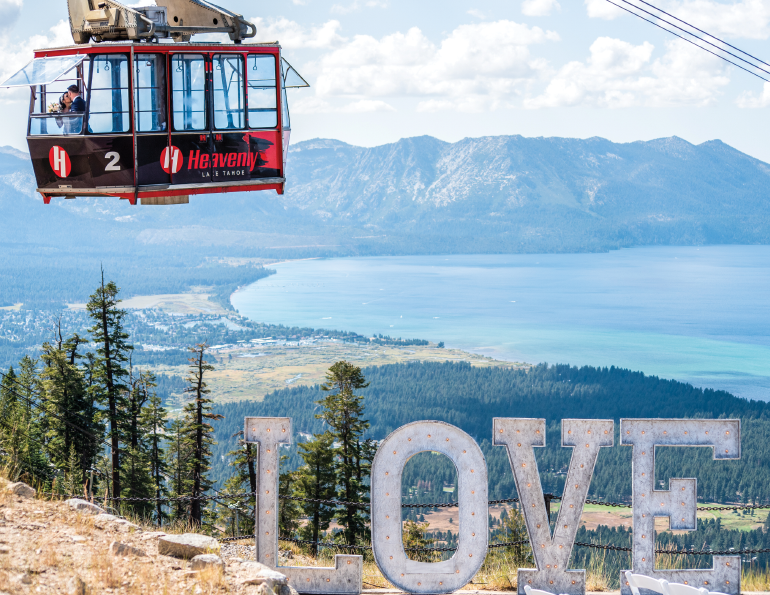The tradition of the dowry is the ancient practice of a gift, given by the bride’s family at wedding time. In most cases, the dowry was meant to be a financial cushion for the bridal couple as they started their life together. Ski resorts large and small are discovering a kind of dowry of their own: Weddings themselves.
While weddings typically have a minimal bottom line effect (most resorts find the share of revenue is in the single digits), most will tell you the business is a cushion, and yes, a gift in multiple ways.
But making it so requires planning. Just like marriage itself, it’s important to think about who you are, where you are in your resort life, and if you and weddings are a match meant to be. That’s especially true about hosting weddings in winter; it requires a delicate touch to stage alpine activities and weddings simultaneously (and harmoniously).
SAM spoke with managers at resorts large and small that successfully weave weddings into their existence to get a feel for what works, and what doesn’t.
As Bennet van der Genugten, director of mountain dining at Heavenly Mountain Resort in California says, the mountain resort wedding business “is not something you should tiptoe into. There are investments (time, money, energy, and more) you have to make. But when it fits? It’s worth it.”
Invest in the Experience …
New York’s Greek Peak Mountain Resort hosts 50 weddings in the average year, and as many as 82 in some busy post-Covid years. The area can accommodate a breadth of party sizes—from tiny to as many as 300 guests—at various on-mountain location choices. Most weddings now take place in the fall; not long ago, winter weddings were more popular.
In 2022, Greek Peak opened a 4,500-square-foot venue called The Lookout, purpose built to host weddings and special events.
The resort felt confident in the investment, says Greek Peak director of sales Kimberly Thayer, because it had seen a massive increase in non-winter activities in the years prior to Covid. Adding a wedding-specific venue, she says, felt like a natural fit, and is part of the vision and passion of owners John and Christine Meier.
With a variety of other year-round activities and attractions, the new venue allows for weddings to have a little separation from the rest of the resort, but it’s still a balancing act from an operations standpoint.
“There are a lot of challenges with things like coordination and timing, and more, that you have to be able to both accept and work out,” Thayer says, to keep everyone happy. “At any one time, you can have a bride, skiers, and general business all at the same time. You have to be sure you can keep everything going well and not overlay one on the other.”
... Because Weddings Can Help With Staff Retention
A few hours north, Camp Fortune, a ski and summer resort just outside of Ottawa, Ontario, has long been a site for weddings and corporate/special events. Post-pandemic, it built an addition onto its base lodge, in part to offer another venue for weddings, and worked at recapturing the market.
While that business is not a cash cow, it is growing, says assistant general manager Erin Boucher. Plus, weddings bring other benefits. The biggest: staff retention, particularly chefs.
Keeping the chef happy. “The main reason we do this is it helps us keep our key staff year-round,” Boucher says. “Managers, sales staff, and very much chefs; this kind of business helps us not just attract them, but keep them.”
For chefs, she says, it’s about more than paying a living wage year-round. Ski resort cuisine can be—how to be polite?—less challenging and inspiring than many chefs desire. The wedding business gives them a creative outlet.
At Heavenly, van der Genugten agrees that strong year-round staffing is a major benefit of a strong wedding/special event program. It helps create consistency with staff, and saves on training time. It also removes much of the angst around hiring and onboarding.
“When you have a healthy wedding program, it makes all that much easier,” he notes.
 Left to right: The recent expansion to the Camp Fortune lodge (left side) adds a modern wedding venue option to supplement the classic A-frame lodge; Wedding guests at Blue Mountain, Pa., are right in the middle of the summer ops action—which is part of the resort’s draw—and take in the long view.
Left to right: The recent expansion to the Camp Fortune lodge (left side) adds a modern wedding venue option to supplement the classic A-frame lodge; Wedding guests at Blue Mountain, Pa., are right in the middle of the summer ops action—which is part of the resort’s draw—and take in the long view.
Know Who You Are ...
To do weddings well, it’s important to know what makes you an attractive partner.
At Camp Fortune, the location of choice for on-site weddings had been an older, classic A-frame lodge. When the area relaunched its wedding business post-pandemic with the addition of the new, updated lodge space as well (reimagined with more classic and formal weddings in mind), the resort expected that newer spot to be a popular choice.
However, they quickly realized otherwise, says Boucher.
“We were convinced this would be the new, hot wedding venue here,” she says. “But you know what? Everyone wants that classic A-frame.” The new space works well for ski season weddings and is in no way a mistake, she says, but the area learned a key lesson: Know who you are in the wedding relationship.
... Make Sure the Bride Knows, Too
There’s a lot that potential wedding customers need to understand—and embrace—before committing to a ski-area wedding. Most ski resort venues don’t feel like, say, a city-based Four Seasons.
So share exactly who you are. Be clear to your potential wedding parties, particularly the brides, about the experience. As perfect as it may sound, a mountain wedding is not the vision for all.
“You can get a second chance at a ski day, but not at a wedding,” says van der Genugten.
What the customer wants. “You need to deep dive into what the customer is looking for,” he advises. “For instance, in the Tahoe area, Kirkwood is a very ‘hideaway wedding’ location. Northstar is very integrated with all that’s going on there.”
At Heavenly, summer is wildly busy, but wedding parties have their privacy. Summer ops take place on one peak, served by the Heavenly gondola; weddings on another peak that’s dedicated to the purpose, with exclusive use of Lakeview Lodge and private transport up and down the mountain on the aerial tram that serves it. Helping a couple figure out what they want and where that fits at the resort is key, he says.
What you offer. So, too, is being honest about your resort’s peccadilloes.
For instance, says Boucher, if your facilities include classic ski resort restrooms (you know what we mean), be sure potential wedding parties are OK with that. “Ski area bathrooms are something skiers are used to, but this is a whole other set of eyes,” she says. Be honest and tour the entire facility ahead of time, and offer reasonable tweaks to try and meet their needs.
“We are more of a ‘natural choice,’” she says. “And that’s fine—we just need to be open about it.”
Wedding Guests And Other Strangers
At Blue Mountain, Pa., weddings take place smack in the middle of the action, and usually on busy “green season” days. It is vital, then, says marketing director Ashley Seier, to help potential parties see and understand this, and show them how the mountain makes it work.
There, weddings take place at the spot where summer operations converge, with a zip line, restaurant, and wedding venue all within shouting distance. It’s not private. So, the team at Blue shares with potential clients just what that feels like and why it may be a good fit.
Blue has a somewhat iconoclastic yet successful system: When weddings happen on busy days, the area implements a quiet time (usually less than an hour) when the zip line shuts down, music is muted, and staff inform guests across the resort that a wedding is taking place.
Blue has discovered something most other resorts realize as well: The general public mostly loves and appreciates a wedding and will take extra steps to give a wedding party space.
“We’ve really not had a complaint,” says Seier. “And it’s rather nice. People gather in the distance or at the restaurant and watch. Typically, the guests love it, and it actually is pretty fun for the wedding parties as well.”
The lesson in this? “You have to stay true to what your mountain vibe is,” she says. “There are a lot of clients who are into the ‘backyard’ vibe, which is ours. You don’t have to totally dress the place up to make it just right.”
At busy Greek Peak, Thayer agrees. “People are more patient with weddings,” she says. “Usually the [non-wedding] guests on site are so excited, they grab their phones [for photos].”
 Left to right: Below: Greek Peak, N.Y., built The Lookout expressly to host weddings and special events, especially in non-winter months; Camp Fortune, Ontario, did something similar, but winter weddings remain popular.
Left to right: Below: Greek Peak, N.Y., built The Lookout expressly to host weddings and special events, especially in non-winter months; Camp Fortune, Ontario, did something similar, but winter weddings remain popular.
If You Take the Leap
Mountain wedding veterans have several tips for those new to, or planning for, the wedding game.
Dedicated staff. First up, says Thayer: “Don’t skimp on staff. You need dedicated people (for the wedding program as well as for other ops programs). Overlapping does not work.”
Internal communication. At the same time, it’s vital for all staff to be completely aware of any wedding plans. “Communicate across the board as a team,” says van der Genugten.
He recalls a long-ago summer wedding (at another resort that need not be named) when maintenance shut off water access during the event. “I’ve never had a more intense interaction than with the bride that day,” he says.
Invest in marketing. Know, too, that a successful wedding business requires year-round and full-scale marketing.
Resorts that don’t host weddings in winter still host potential client tours during the season. And most resorts do wedding outreach, from attending bridal shows to using social media and more. At bridal shows, resorts mostly market to the wedding planners and others who help with those decisions.
Smart resorts, too, market on-site with signage, video, and in some cases, person-to-person outreach.
“We have so many engagements happen here,” says van der Genugten, “it’s almost natural to suggest they have their wedding here.” With Vail Resorts looking to grow ancillary revenue, he offers a bonus to any staff who get someone to express interest in a wedding there.
Weddings also introduce new visitors to the resort, says Thayer. “Sure, we get the couples who met here, grew up skiing here and are now marrying here. But many of the guests have never been. They come for the wedding, see who we are and think, ‘I need to come back here.’ It’s great.”
The Joy of It All
Finally, there’s just the injection of pure happiness that weddings bring. From the semi-kooky—like the couple who requested a donkey to serve the beer at their reception (Thayer was unable to fulfill that wish)—to the classic chairlift-in-wedding-attire photo shoots, weddings bring endless “so cool” moments for all.
At Blue, Seier has seen a lot, like the groom who arrived by helicopter as his bride arrived via horse drawn carriage.
The best? “Our learning center director’s wedding,” she says, laughing. “Both bride and groom took their vows and then zip lined down.”
That’s one way to help a marriage get off to a flying start.





